A Hearty Faith and a Healthier World
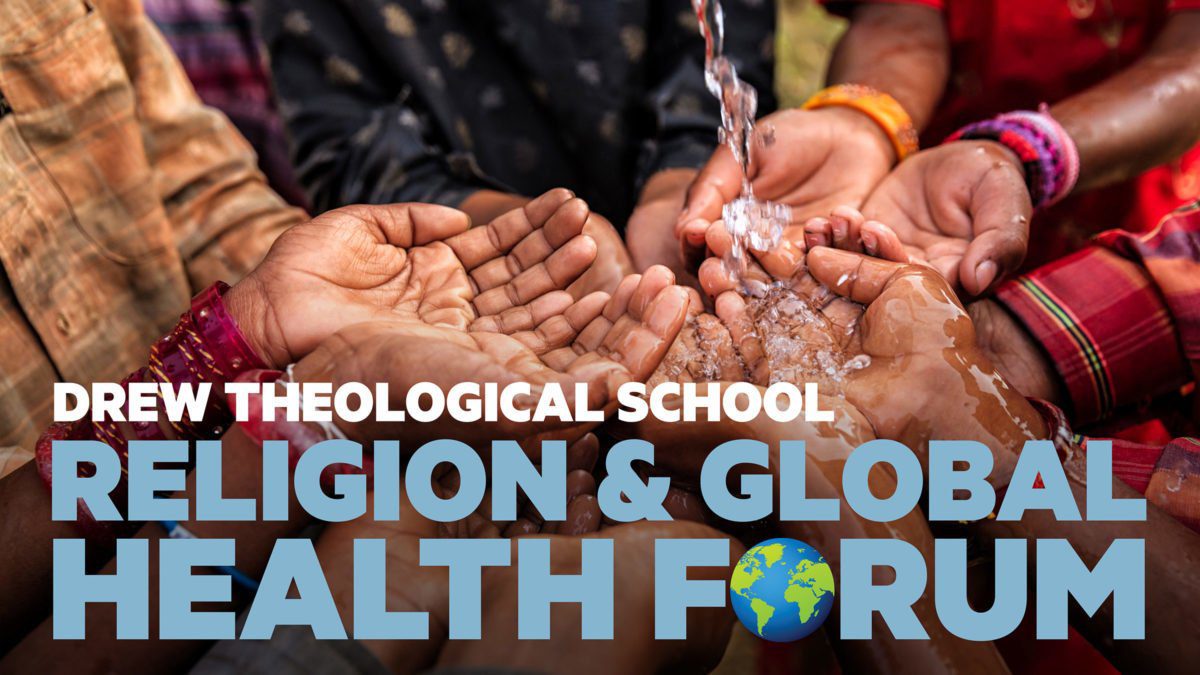
Welcome to the Religion and Global Health Forum (RGHF) – henceforth the Forum. Inspired by one of the ancient prophet’s questions: “Is there no Balm in Gilead? Is there no doctor there?” (Jer. 8:24), we at the Forum have a dream:
To build a world where peoples of all socio-economic, racial, religious, gendered, geographical, cultural, and differently abled backgrounds and bodies, especially the historically marginalized, have access to consistent, quality healthcare and dignity.
For us, this dream requires intentional, ethical, holistic, and strategic considerations of how religion and faith can and do function as healthcare assets, and as catalysts for high quality healthcare outcomes in the global landscape and experience.
The Forum partners with scientists, researchers, religious leaders, writers, poets, educators, counselors, etc. in the fields of medical, social, political, and environmental sciences, to host panel discussions, presentations, and partnership building platforms that will improve individual and public health outcomes across the world. The Forum brings the expertise of different health-related disciplines to share knowledge, strategies, challenges, and processes associated with examining religion as a health asset and a catalyst for health.
The Dream
- Religion and Phytomedicine
- Religion, the Arts, and Health
- Religion, Disability and Health
- Religion and Palliative Care
- Religion and Mental Health
- Religion, Trauma and Hope
- Religion and Environmental Health
- Religion, Gender, and Health
- Religion, Race/Ethnicity, and Health
- Religion, Sports and Health
Building the Dream
The Forum is an offshoot of the Harvard Global Health Catalyst (HGHC), a cross institutional program at Harvard, with overall goal of catalyzing high impact international collaborations to eliminate global health disparities. Since 2017, the HGHC has hosted “Religion and Health” sessions at its annual summit event. These sessions attracted interest from religious professionals, faith-based leaders, and researchers across multiple disciplines. Having participated in those sessions and contributed to an edited volume on the summit proceedings (Wilfred Ngwa and Paul Nguyen eds., Global Oncology: Harvard Global Health Catalyst Summit Lecture Notes, 2017), Dr. Kenneth Ngwa developed and taught a course on “Religion and Health” (Fall 2018) at Drew University Theological School, with a guest presentation on cancer research, by Dr. Wilfred Ngwa. The success of these sessions necessitates more robust and expansive planning, resourcing, scholarship, and partnership development.
The Forum is partly rooted in legacy of Drew’s Center for Christianities in Global Contexts (CCGC). Established in 2006 with a generous grant from the Henry Luce Foundation, the Center supported research, reflection, and collaborative engagement around Christianity’s vastly diverse expressions in an increasingly complex world. Shaping the mission of CCGC was the urgent need to better understand the forces of globalization and pluralism that shape Christianity today; the demographic, spiritual, and cultural shifts animating and defining the life and ministries of the global church; the deep religious, historical, and cultural heritage that informs interreligious dialogue and collaboration; and a commitment to promoting the study of the critical and constructive roles that Christian faith and mission play in promoting ecumenism, religious and ethnic pluralism, and social and ecological justice.
The World Health Organization (WHO) defines health as “a state of complete physical, mental and social well-being and not merely the absence of disease or infirmity.” Indeed, WHO sees “the extension to all peoples of the benefits of medical, psychological and related knowledge” as “essential to the fullest attainment of health.” Despite major advances in modern scientific medicine, including the eradication of some diseases, the challenges of global and public health – the health of populations – continue to escape the capacities and resources of any singular discipline. Chronic diseases remain unsolved; historically marginalized communities suffer from social illnesses and internalized traumas that require medical, religious, and cultural competencies to diagnose and address; and the wider experiences of human suffering, ageing, and death continue to raise questions about the value and meaning of life. These questions touch on the human body and its constituent parts: the heart, the mind, the spirit, the brain, the womb, etc.; impact the social body, with its constituent parts: culture, art and music, ethnicity and race, history, education, family, etc.; and affect the ecological body, with its constituent parts: the water, the plants, the food, the economy, etc. How might religious theories and praxis, faith and action, contribute to proper holistic diagnoses and responses to these BIG issues of life and health and meaning?
Action Plan and Principles
Four Anchors of “Global” in Global Health
Resource Pooling (“What is that in your Hands?” – Exodus 4:2)
- Identify local and global resources – financial, professional skills, curricular, etc.
- Identify local and global institutions to partner with, to implement achievable goals
- Organize and/or participate in education workshops or panels on religion and health
Fly into the Clouds (“Mount up with Wings like Eagles” – Isaiah 40:31)
- Engage the ecologies (social, cultural, ritual, environmental) of health, consistent with WHO’s definition of holistic health
- Engage with Information and Communications Technology (ICTs) to enhance the global experience of health and wellness
- Engage the whole person – body, mind, and spirit – in community (past and future)
Go Extra with the Samaritan App (“I will reimburse you for an Extra Expense” – Luke 10:35)
- Participate in or sponsor the extra step through the Samaritan App Neighbors
- Build a safe space/platform of integrity for global healing
- Expand global neighborly reach
Establish a Healthy Legacy (“Whatever you did for the Least of These… You did for Me” – Matthew 25:40)
- Healthy bodies live longer – Building local communities of health
- Healthy Actions have far-reaching impact – developing advocacy plans to dismantle unhealthy institutions
- Pleasant Surprises! – Produce joyful and hopeful structures and systems
Interested in Partnering?
What will RGHF do?
-
Provide professional mentorship around faith, science and healthcare
-
Provide quarterly information through its Newsletter, “Breathing.”
-
Offer mini grants to faith leaders for individuals or groups to assist in health work in their ministerial settings. Grants may be used for design or implementation of projects
-
Provide annual gatherings with the full Global Health Catalyst consortium
-
Provide avenues for getting involved in health advocacy and community mobilization
What will CFL members do?
-
Work on a project that fulfills the RGHF’s signature NSB 846 project. For more information, see neverstopbreathing.org
If you have any other questions or comments, please email [email protected].
The Forum – An Archive of the RGHF’s Monthly Newsletters and Other Statements
Religion and Global Health Forum – News Report and Past Events
Our Partners
The Harvard Global Health Catalyst
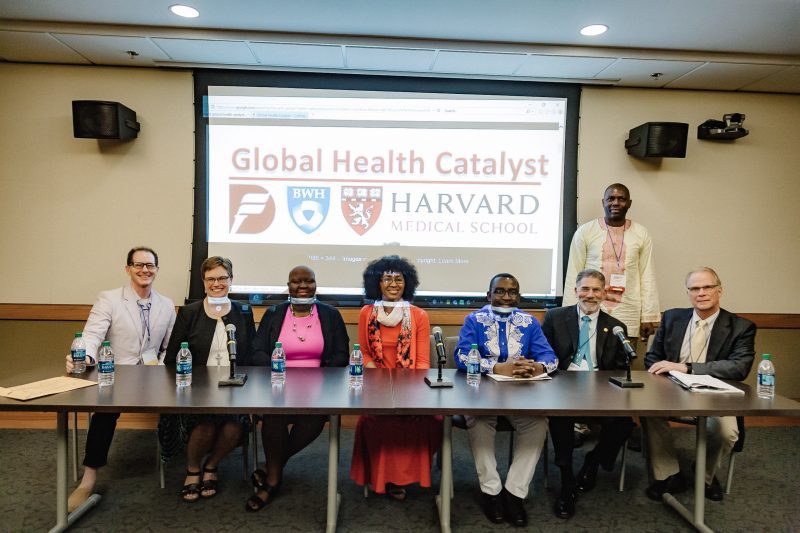
The Harvard Global Health Catalyst (HGHC) is a cross institutional program at Harvard, with overall goal of catalyzing high impact international collaborations to eliminate global health disparities. To realize this goal, the HGHC has adopted a transformative approach that leverages the value of human connectedness espoused by Ubuntu, and implemented by facilitating high impact global health collaborations, with unprecedented engagement of minorities and diaspora communities to alter the effects of brain and resource drain from underserved communities into global health gain and narrow healthcare disparities. The Ubuntu approach also leverages the tremendous power of advanced Information and Communication Technologies (ICTs) as well as Artificial Intelligence (AI) to increase space-time flexible access to health care, research and education. HGHC activities include: 1) yearly global health summits at Harvard Medical School with satellite summits around the world to share knowledge and seed or advance collaborations; 2) the HGHC win-win initiative working with industry, government leaders, the diaspora and non-profit organizations to dramatically increase access to cancer care, research, and education, and thus reduce cancer health disparities in the USA and around the world; 3) supporting the International Phytomedicines Institute at Harvard; and 4) forging high impact international collaborations to advance global health.
The HGHC is funded by the Radcliffe Institute for Advanced Studies at Harvard University, Brigham and Women’s Hospital, Dana-Farber Cancer Institute, Foundations and a growing number of industry and organization partners.
The Medical Humanities Program at Drew University
Sikhona, Inc.

Sikhona Inc., works for Health Equity by promoting holistic health and wellness for individuals and communities. Sikhona provides information, education, resources and organizational support that is culturally competent, contextually appropriate and spiritually integrated for Africana people. Sikhona works towards the elimination of health care disparities for African Americans, while recognizing the universality of health and wellness global relationships are encouraged. Committed to the integration of spirituality, medicine, health, and well-being, Sikhona engages with the congregations as well as faith based, community, educational, medical, social services, and non-governmental organizations to raise awareness and deliver services. Sikhona works primarily through local congregations. There are four areas of engagement:
- Global health for Women and Girls;
- Africana Male Health;
- Africana Cancer Awareness, Prevention, Treatment, and Survivorship; and
- Africana Trauma Awareness, Prevention, and Treatment.
Sikhona was founded former RGHF Student Research Associate, The Rev. Vanessa Wilson, JD, MDiv.
Vanbert Health Equity Project

The Religion and Global Health Forum is also partnering with the Vanbert Health Equity Project.
Meet the RGHF Director & Student Research Associates
Dr. Kenneth Ngwa, Forum Director
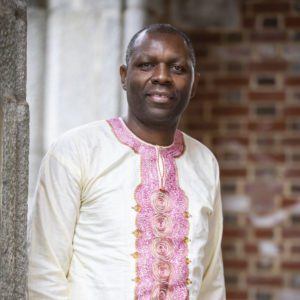 Kenneth Ngwa is Associate Professor of Hebrew Bible at Drew University Theological School. He holds a Ph.D. (2005) from Princeton Theological Seminary; and a Masters of Divinity (1995) from the Faculty of Protestant Theology in Cameroon. His major research interests are in the areas of ancient Israelite Wisdom Literature and Africana biblical hermeneutics. He is the author of The Hermeneutics of the ‘Happy’ Ending in Job 42:7-17, and is currently working on a monograph titled, Let My People Live: Towards an Africana Reading of Exodus. He is also an organizing member of the Global Health Catalyst summit – an annual summit that meets in Harvard medical School – where he co-hosts a session on Religion and Health.
Kenneth Ngwa is Associate Professor of Hebrew Bible at Drew University Theological School. He holds a Ph.D. (2005) from Princeton Theological Seminary; and a Masters of Divinity (1995) from the Faculty of Protestant Theology in Cameroon. His major research interests are in the areas of ancient Israelite Wisdom Literature and Africana biblical hermeneutics. He is the author of The Hermeneutics of the ‘Happy’ Ending in Job 42:7-17, and is currently working on a monograph titled, Let My People Live: Towards an Africana Reading of Exodus. He is also an organizing member of the Global Health Catalyst summit – an annual summit that meets in Harvard medical School – where he co-hosts a session on Religion and Health.Sharon Kimberly Williams, Doctoral Candidate
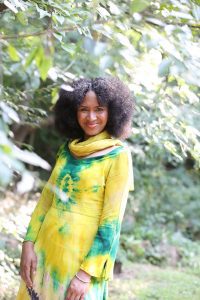 Sharon Kimberly Williams is an arts and letters doctoral candidate in The Caspersen Graduate School of Drew University where she is pursuing the doctor of letters (D.Litt.) degree in the Studies in Religion and the Fine Arts. Her research interests include Spirituality and Healing in the Arts and Music Therapy in Biblical Antiquity. Her research interests include Spirituality and Healing in the Arts and Music Therapy in Biblical Antiquity. The themes of pain, love, beauty, and lament that occur in her writing are based on her studies in the fields of music and theology, Africana poetics, and Hebrew poetry. Sharon has performed music and poetry all around the world. Currently, she is working on publishing her first collection of poetry entitled, Breath|Voice|Fire. Sharon serves as a contributor to Harvard Medical School’s Global Health Catalyst, an initiative that advocates for eliminating global health disparities. She resides in Madison, New Jersey.
Sharon Kimberly Williams is an arts and letters doctoral candidate in The Caspersen Graduate School of Drew University where she is pursuing the doctor of letters (D.Litt.) degree in the Studies in Religion and the Fine Arts. Her research interests include Spirituality and Healing in the Arts and Music Therapy in Biblical Antiquity. Her research interests include Spirituality and Healing in the Arts and Music Therapy in Biblical Antiquity. The themes of pain, love, beauty, and lament that occur in her writing are based on her studies in the fields of music and theology, Africana poetics, and Hebrew poetry. Sharon has performed music and poetry all around the world. Currently, she is working on publishing her first collection of poetry entitled, Breath|Voice|Fire. Sharon serves as a contributor to Harvard Medical School’s Global Health Catalyst, an initiative that advocates for eliminating global health disparities. She resides in Madison, New Jersey.
Email: [email protected]
Website: http://sharonkimberlywilliams.org/
Janet Okang (Jane), Doctoral Candidate
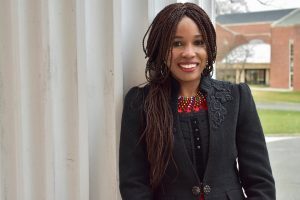 Janet Okang (Jane) is the founding President of Amanfrom Academy in the Eastern Region of Ghana. She was a faculty member, pastoral staff, and Bursar of The Bible College of Ghana prior to arriving in the United States for graduate studies. Apart from her passion for equipping women for Christian ministry, her commitment to empowering and educating “underprivileged” children has taken her to several rural areas.
Janet Okang (Jane) is the founding President of Amanfrom Academy in the Eastern Region of Ghana. She was a faculty member, pastoral staff, and Bursar of The Bible College of Ghana prior to arriving in the United States for graduate studies. Apart from her passion for equipping women for Christian ministry, her commitment to empowering and educating “underprivileged” children has taken her to several rural areas.
Jane is a graduate of Regent University in Ghana (BA), Union Theological Seminary in the City of New York (MA & STM), and now a doctoral student at Drew University, pursuing a Ph.D. in Bible and Cultures with a concentration in New Testament Studies.
Her research interests include Comparative study of mealtime fellowship in the New Testament, Greco-Roman antiquity, and West African mealtime traditions. Other areas include the Bible and Culture and the portrait of children in New Testament discourses.
She loves playing with children and enjoying the beauty of nature in outdoor activities.
Email: [email protected]
Yajenlemla, Doctoral Candidate
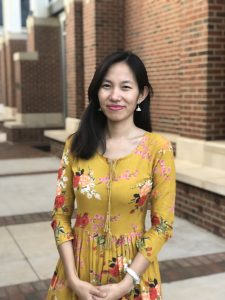 Yajenlemla is pursuing her PhD in Bible and Cultures at Drew University. Her research interests are New Testament Studies, Purity Culture, and Postcolonial (Asian) Biblical Criticism. She is an intern at Drew’s Religion and Global Health Forum, a Research Assistant, and a Graduate Student Assistant (Dean’s Office).
Yajenlemla is pursuing her PhD in Bible and Cultures at Drew University. Her research interests are New Testament Studies, Purity Culture, and Postcolonial (Asian) Biblical Criticism. She is an intern at Drew’s Religion and Global Health Forum, a Research Assistant, and a Graduate Student Assistant (Dean’s Office).
Yajen has a Master of Arts in Theological Studies (2020) from Columbia Theological Seminary, Decatur, GA. She also has a Bachelor of Divinity (2017) from United Theological College, India, and a Bachelor of Arts with Honors (2012) from St. Mary’s College, India. Prior to arriving in the United States, she served as a Youth Director in her home church, Chang Baptist Church Dimapur (Nagaland, India). Her passion lies in empowering and equipping her community and church, especially women.